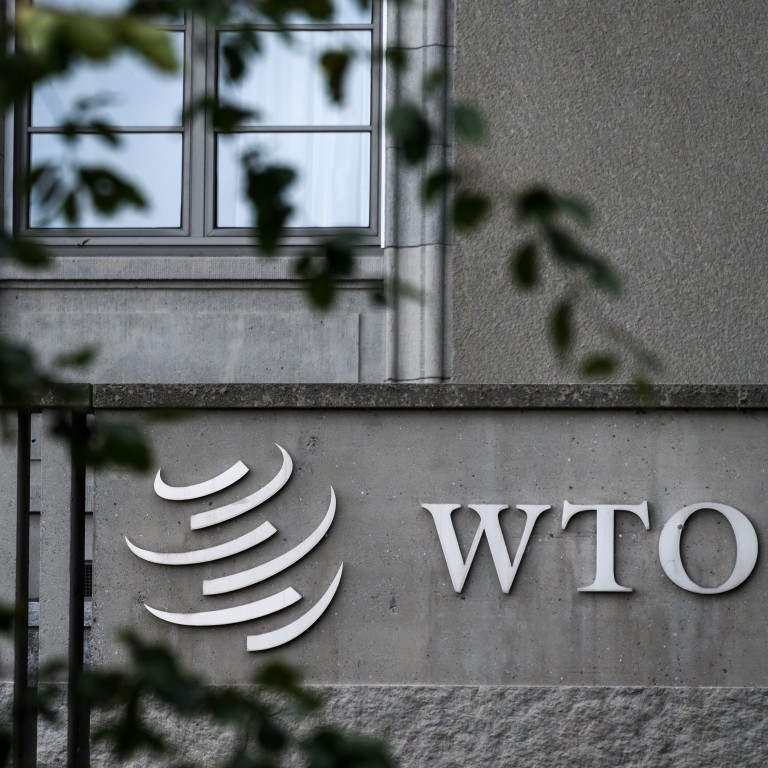
China to use ‘legitimate’ WTO retaliatory tariffs as ‘bargaining chips’ in US trade war negotiations
- Scale will be minuscule compared to those levied during 15-month trade war, but are backed by the WTO stemming from an Obama-era trade dispute
- Experts say that while any tariffs may take a year to finalise, they could upset Donald Trump, a known WTO critic, and in turn ‘upend’ the trade talks
China’s pursuit of US$2.4 billion in “legitimate” retaliatory tariffs against the United States, stemming from an Obama-era trade dispute, could be used as a bargaining chip in upcoming negotiations with Washington, experts have said.
On Monday, China announced its next move in the long-running World Trade Organisation (WTO) dispute after the Geneva-based governing body for trade found in July that Washington did not fully comply with a ruling pertaining to the removal of anti-subsidy tariffs on Chinese goods ranging from solar panels to steel cylinders, which have been in place since 2012.
The value of tariffs China is now seeking to impose will be ruled on by the WTO’s arbitration body, which will ultimately rule on whether the US$2.4 billion sum matches the perceived damage to China’s economy.
“Any request for trade retaliation gets litigated, and an arbitrator decides the amount of allowable tariffs. The final amount is sure to be less than the US$2.4 billion,” said Simon Lester, associate director at the Cato Institute and former legal affairs officer at the Appellate Body Secretariat of the WTO.
This will give China bargaining chips in the talks. It might not want to impose more tariffs, but if it does choose that route, they will be sanctioned by the WTO, so they have the right to do so
“This will give China bargaining chips in the talks. It might not want to impose more tariffs, but if it does choose that route, they will be sanctioned by the WTO, so they have the right to do so,” said Henry Gao, a professor in law specialising in the WTO at Singapore Management University. “All the other additional tariffs have violated WTO rules, but this is totally legit.”
The figure that is decided upon by the WTO can be converted into tariffs by China on whichever US goods it chooses. The retaliatory measures will be temporary, but may remain in place until the US drops the duties on Chinese goods which were found to violate WTO terms.
However, Gao described the issue as “one of systemic importance to China, since it has had big problems with countervailing duties for a long time”.
Furthermore, the action shows that China is continuing to seek action through the multilateral trading system, even while the world’s two largest economies hammer each other with unilateral duties outside the system.
“The US’ reaction indicates that it will continue its criticism of the WTO dispute settlement system and continue unilateral actions against China's economic policies,” said Ben Kostrzewa, a Hong Kong-based international trade lawyer at Hogan Lovells and former assistant general counsel at the Office of the US Trade Representative (USTR), focused on disputes with China.
He added that the implementation of any tariffs is likely to be “at least a year away” and would amount to a “small skirmish” on the fringes of the broader trade war.
China, though, may opt to not impose tariffs to avoid provoking US President Donald Trump, who has been a consistent and sharp critic of the WTO.
“This could possibly upend trade talks,” said Bryan Mercurio, a professor specialising in global trade law at the Chinese University of Hong Kong. “But China has done it in a strategic way to show that it is serious in protecting its own interests and to give itself a bit of leverage in the talks.”
This could possibly upend trade talks. But China has done it in a strategic way to show that it is serious in protecting its own interests and to give itself a bit of leverage in the talks
Negotiators appeared to make progress towards a “phase one” trade deal in Washington earlier in October, with the US postponing a tariff increase from 25 per cent to 30 per cent on US$250 billion of Chinese goods. China is also set to increase US agricultural purchases, while also considering unspecified changes to its currency and intellectual property rules and opening up its financial services sector.
“Remember that we do not currently have a [US-China trade war] deal,” added Deborah Elms, executive director of the Asian Trade Centre. “I am sceptical that we are going to have one. But anything that can be used as an excuse to not make a deal may be used in that way, and a multibillion-dollar claim is another great excuse not to have a deal.”
“I think [USTR] Robert Lighthizer would recognise that at the WTO, you win some, you lose some,” added Gao from Singapore Management University. “But Trump could take this personally, and you know, maybe there could be some sort of violent reaction.”

